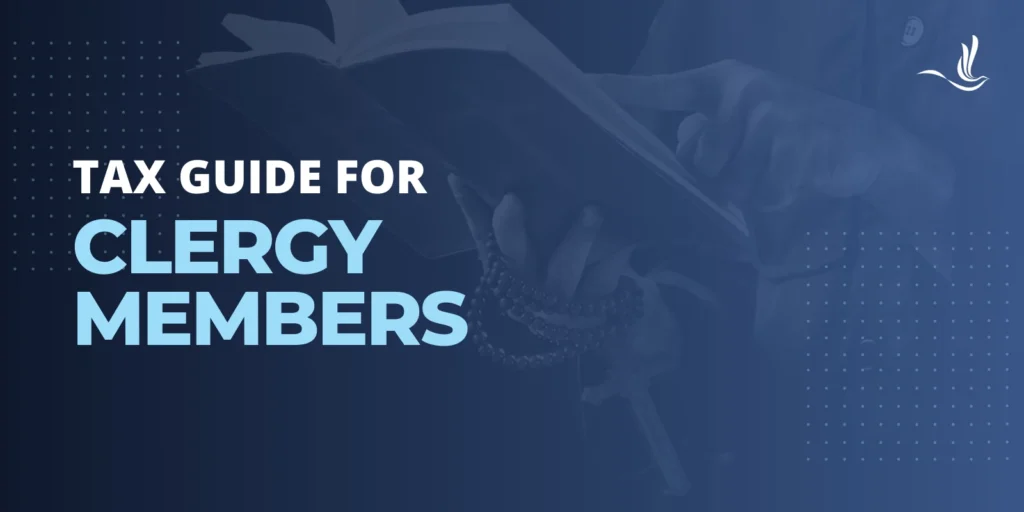
Tax season can be a stressful time for many individuals, but for clergy members, it often comes with its own set of unique challenges and considerations. Whether you’re a minister, priest, rabbi, imam, or any other religious leader, understanding the intricacies of tax laws can help you maximize your deductions and ensure compliance with the IRS. Here is a brief tax guide for clergy members to help navigate tax season with confidence.
Who Qualifies as a Minister?
The IRS states that any licensed, commissioned, or ordained minister can perform ministerial duties, and be taxed accordingly. They use the term minister as a broad term to describe any religious leader.
Know Your Tax Status
Clergy members are considered employees for federal income tax purposes. However, they are treated as self-employed individuals for Social Security and Medicare taxes known as self-employment taxes. If you’re a clergy member, this dual status can affect how you report your income and claim deductions, so it’s crucial to understand tax status accurately.
Report All Income
As a clergy member, you may receive income from various sources, including salary, honoraria, fees for services, and donations. Make sure to report all sources of income accurately on your tax return, including income received in the form of cash or non-cash gifts. Some of your income will be reported on Form 1040 and some on Schedule SE.
Housing Allowance
One significant benefit for clergy members is the housing allowance, which allows you to exclude the fair rental value of a home (including furnishings and utilities) provided as part of your compensation from taxable income. However, any amount that exceeds the fair rental value should be included as income on Schedule C.
Love Offering
Love offering is any funds gathered from congregants by passing around a collection plate during religious service. When the offering is for a minister specifically, and not the church itself, this is considered gross income. The one exception in which this income does not need to be reported is if the minister is receiving the funds as a retirement or farewell gift.
Missionary Trip Income
Sometimes a clergy member may be sent by the church to another country to do missionary work. Any income earned during this time should be reported. However, keep in mind that taxes may also be owed to the foreign country. If this is the case, you can take the foreign income exclusion or foreign tax credit. There is also a foreign housing exclusion you can claim. These credits can help avoid double taxation.
How to Pay Taxes as a Clergy Member
As mentioned, the dual status can make tax filing tricky for clergy members. There are a few key things to remember when filing your return.
- Tax Withholding: Even though you are partly considered an employee for tax purposes, the church likely will not withhold taxes from your paycheck. You may be able to request that they do. That said, you will likely need to pay estimated tax payments each quarter.
- Self-Employment Tax: Some items will be included when calculating your federal tax bill and be excluded when calculating your self-employment tax, or vice versa. For example, housing allowances can be excluded from gross income on your federal return. However, they do need to be included when calculating self-employment tax.
- Schedule C: Schedule C is a form used by self-employed individuals. You can use this as a partially self-employed individual. However, you may not include any church expenses on Schedule C. You can only include business expenses you had as a self-employed clergy member. Examples include costs associated with officiating weddings, offering funeral services, and others.
Tax Exemptions
You may be able to request an exemption from paying self-employment taxes. To do this, you must meet certain qualifications, including:
- You must reject public insurance for religious or conscientious reasons
- You must have had net earnings of at least $400 for at least two tax years
If you meet these terms, you can file Form 4361, Application for Exemption From Self-Employment Tax for Use by Ministers, Members of Religious Orders and Christian Science Practitioners. You must file by the tax deadline. However, take caution as this exemption is not revocable. This means that if approved, you will no longer be eligible to receive Social Security benefits.
Tax Help for Clergy Members
By following these tips and staying informed about tax laws affecting clergy members, you can navigate tax season with confidence and peace of mind. Remember to keep accurate records, take advantage of available deductions and benefits, and seek professional assistance when needed to ensure that your tax reporting is accurate and compliant. With careful planning and attention to detail, you can make tax season a little less stressful and focus on what matters most – serving your congregation and community. Optima Tax Relief is the nation’s leading tax resolution firm with over a decade of experience helping taxpayers with tough tax situations.
Contact Us Today for a No-Obligation Free Consultation